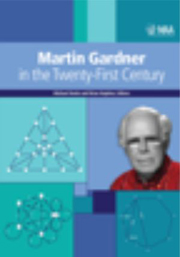Book contents
- Frontmatter
- Preface
- Contents
- I Geometry
- II Number Theory and Graph Theory
- III Flexagons and Catalan Numbers
- IV Making Things Fit
- V Further Puzzles and Games
- VI Cards and Probability
- VII Other Aspects of Martin Gardner
- 36 Against the Odds
- 37 A Modular Miracle
- 38 The Golden Ratio—A Contrary Viewpoint
- 39 Review of The Mysterious Mr. Ammann by Marjorie Senechal
- 40 Review of PopCo by Scarlett Thomas
- 41 Superstrings and Thelma
- Index
- About the Editors
40 - Review of PopCo by Scarlett Thomas
from VII - Other Aspects of Martin Gardner
- Frontmatter
- Preface
- Contents
- I Geometry
- II Number Theory and Graph Theory
- III Flexagons and Catalan Numbers
- IV Making Things Fit
- V Further Puzzles and Games
- VI Cards and Probability
- VII Other Aspects of Martin Gardner
- 36 Against the Odds
- 37 A Modular Miracle
- 38 The Golden Ratio—A Contrary Viewpoint
- 39 Review of The Mysterious Mr. Ammann by Marjorie Senechal
- 40 Review of PopCo by Scarlett Thomas
- 41 Superstrings and Thelma
- Index
- About the Editors
Summary
This is the only novel I know of that is saturated with mathematics. Alice Butler, the 29-year-old narrator of the story, works for the world's third-largest toy company, PopCo. Her job is to create ideas for toys and games, especially products that will appeal to teen-age girls.
Orphaned when young, Alice is raised by loving and loved grandparents, both of whom are first-rate mathematicians. Her grandfather writes a monthly column on recreational math, said to be similar to the one I wrote for Scientific American. He is obsessed with trying to decode the notorious Voynich manuscript, now widely believed to be a hoax. Although he fails in this project, he succeeds in decoding a cipher-text that reveals the location of a buried treasure. The treasure is on a bird sanctuary, and because digging it up would disturb the birds, he never reveals its location. He does, however, leave cipher clues to Alice. The grandmother's obsession on the other hand is trying to solve the Riemann hypothesis.
Alice has been strongly influenced by her grandfather's fondness for mathematical play, and she constantly interrupts her narrative with accurate descriptions of a variety of mathematical topics. These include Conway's computer game of Life, Newcomb's famous paradox involving decision theory, trapdoor ciphers, and the Monty Hall problem of the three doors. In addition to recreational topics, Alice provides excellent accounts of Cantor's alephs, prime factorization, Gödel's proofs, and even the Riemann hypothesis!
- Type
- Chapter
- Information
- Martin Gardner in the Twenty-First Century , pp. 287 - 288Publisher: Mathematical Association of AmericaPrint publication year: 2012



